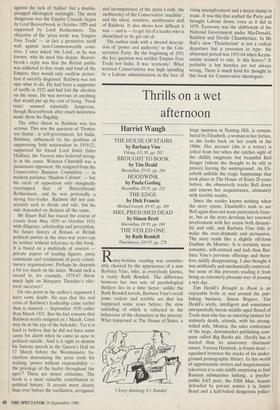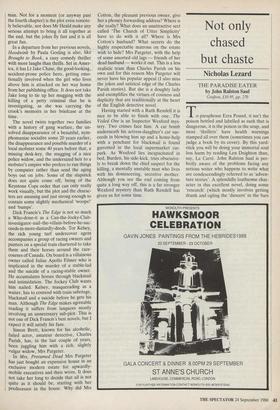Thrills on a wet afternoon
Harriet Waugh
THE HOUSE OF STAIRS by Barbara Vine
Viking, £11.95, pp. 282
BROUGHT TO BOOK by Tim Heald
Macmillan, f9.95, pp. 184
HOODWINK by Paula Gosling
Macmillan, £9.95, pp. 252
THE EDGE by Dick Francis
Michael Joseph, £9.95, pp. 289
MRS, PRESUMED DEAD by Simon Brett
Macmillan, f9.95, pp. 189
THE VEILED ONE by Ruth Rendell
Hutchinson, £10.95, pp. 278
Rainy-holiday reading was consider- ably cheered by the appearance of a new Barbara Vine, who, as everybody knows, is really Ruth Rendell. The difference between her two sets of psychological thrillers lies in a time factor; unlike the Ruth Rendell novels, Barbara Vine's recall some violent and terrible act that has happened some years before, the slow unfolding of which is reflected in the behaviour of the characters in the present. What happened at The House of Stairs, a 1 keep thinking it's Sunday'. large mansion in Notting Hill, is remem- bered by Elisabeth, a woman in her forties, as she looks back on her youth in the 1960s. Her account (she is a writer) is jolted from her when she catches sight of the chillily enigmatic but beautiful Bell Sanger (whom she thought to be still in prison) leaving the underground. As Eli- sabeth unfolds the tragic happenings that took place at The House of Stairs 20 years before, she obsessively tracks Bell down and renews her acquaintance, ultimately with terrible results.
Since the reader knows nothing when the story opens, Elisabeth's wish to see Bell again does not seem particularly bizar- re, but as the story develops her renewed involvement with her seems both distaste- ful and odd, and Barbara Vine fails to make the over-dramatic end persuasive. The story reads like a slightly off-form Daphne du Maurier. It is certainly more romantic, soft-centred and lush than Bar- bara Vine's previous offerings and there- fore mildly disappointing. I also thought it was artificially and mechanically contrived, but none of this prevents reading it from being an extremely pleasant way of passing a wet day.
Tim Heald's Brought to Book is an enjoyable frolic in and around the pub- lishing business. Simon Bognor, Tim Heald's seedy, intelligent and sometimes unexpectedly heroic middle-aged Board of Trade man who has an unerring instinct for untimely death, attends, with his strong- willed wife, Monica, the sales conference of the large, downmarket publishing com- pany called Big Books plc. Hardly has it started than its unsavoury chairman/ owner, Vernon Hemlock, is found dead squashed between the stacks of his under- ground pornographic library. In this world of opportunistic writers and megalomaniac takeovers it is only mildly surprising to find Russian submarines lurking, a psycho- pathic SAS poet, the Fifth Man, houses defended by private armies a la James Bond and a half-baked dangerous police- man. Not for a moment (or anyway past the fourth chapter) is the plot even remote- ly believable, nor does Mr Heald make any serious attempt to bring it all together at the end, but the jokes fly fast and it is all great fun.
In a departure from her previous novels, Hoodwink by Paula Gosling is also, like Brought to Book, a zany comedy thriller with more laughs than thrills. Set in Amer- ica, it has Lt Jake Chase, the good-looking, accident-prone police hero, getting emo- tionally involved when the girl who lives above him is attacked on her way home from her publishing office. It does not take Jake long to tie up her mugging with the killing of a petty criminal that he is investigating, as she was carrying the crook's memoirs in her briefcase at the time.
The novel twists together two families with a history of gang warfare, the un- solved disappearance of a beautiful, nym- phomaniac socialite some 20 years earlier, the disappearance and possible murder of a local mobster some 40 years before that, a missing desk-key, the mugging of a nice police widow, and the undersized heir to a mobster's empire who prefers to run things by computer rather than send the aging boys out on jobs. Some of the slapstick does not quite come off, being of the Keystone Cops order that can only really work visually, but the plot and the charac- ters are amusing and just strong enough to contain some slightly mechanical `woops!' and 'bumps'.
Dick Francis's The Edge is not so much a Who-done-it as a Can-the-Jocky-Club- investigator-nail-the-villain-before-he-suc- ceeds-in-more-dastardly-deeds. Tor Kelsey, the rich young turf undercover agent accompanies a group of racing owners and punters on a special train chartered to take them and their horses around the race- courses of Canada. On board is a villainous owner called Julius Apollo Filmer who is implicated in the murder of a stable-lad and the suicide of a racing-stable owner. He accumulates horses through blackmail and intimidation. The Jockey Club wants him nailed. Kelsey, masquerading as a waiter, has to contend with train sabotage, blackmail and a suicide before he gets his man. Although The Edge makes agreeable reading it suffers from languors mostly involving an unnecessary sub-plot. This is not one of Dick Francis's best novels, but I expect it will satisfy his fans. Simon Brett, known for his alcoholic, failed actor, amateur detective, Charles Parish, has, in the last couple of years, been juggling him with a rich, slightly vulgar widow, Mrs Pargeter. In Mrs, Presumed Dead Mrs Pargeter has just bought an expensive house in an exclusive modern estate for upwardly- mobile executives and their wives. It does not take her long to decide that all is not quite as it should be, starting with her predecessor in the house. Why did Mrs Cotton, the pleasant previous owner, give her a phoney forwarding address? Where is she really? What does an unattractive sect called 'The Church of Utter Simplicity' have to do with it all? Where is Mrs Cotton's husband? What secrets do the highly respectable matrons on the estate wish to hide? Mrs Pargeter, with the help of some assorted old lags — friends of her dead husband — works it out. This is a less realistic team than Charles Parish on his own and for this reason Mrs Pargeter will never have his popular appeal (I also miss the jokes and satirical edge of the Charles Parish stories). But she is a doughty lady and exemplifies the virtues of cosiness and duplicity that are traditionally at the heart of the English detective novel.
Having started with a Ruth Rendell it is nice to be able to finish with one. The Veiled One is an Inspector Wexford mys- tery. Two crimes face him. A car bomb underneath his actress-daughter's car suc- ceeds in blowing him up and a home-help with a penchant for blackmail is found garrotted in the local supermarket car- park. As Wexford lies incapacitated in bed, Burden, his side-kick, tries obsessive- ly to break down the chief suspect for the killing, a mentally unstable man who lives with his domineering, secretive mother. Although you see the end coming from quite a long way off, this is a far stronger Wexford mystery than Ruth Rendell has given us for some time.































































 Previous page
Previous page